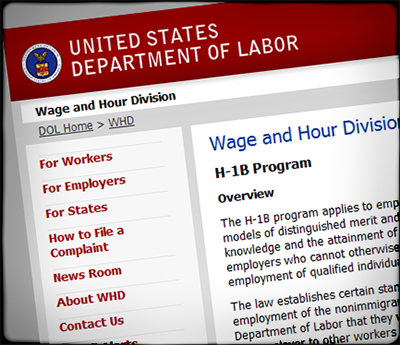
As the tech industry has grown and become more powerful, and created enormous wealth for executives, American workers in the sector have largely seen their wages stagnate. The main driver of this phenomenon is the H-1B nonimmigrant visa, Big Tech’s preferred cheap foreign labor program. Advocates of unlimited immigration describe H-1Bs as “the best and brightest” or “high skilled”, but those are mischaracterizations. Under the law, an H-1B is a nonimmigrant status that allows an alien to work in the United States in a specialty occupation, meaning a job that typically requires at least a bachelor’s degree.
As John Miano explained in a recent post, the H-1B guestworker program “is designed to displace Americans with cheap foreign workers.” After analyzing several provisions of the H-1B law to prove his point, Miano concludes, “Not only did Congress affirmatively and explicitly act to make replacing Americans with H-1B workers legal, but it also has gone to a lot of effort to make this practice legal.” Separately, I highlighted loopholes where Congress allowed H-1Bs to essentially work in the country permanently, rather than the six-year maximum period that facially appears in the law. Combined, Congress has created a continuous pipeline of cheap foreign labor that directly harms the wages and job opportunities for American tech workers.
Rep. Jim Banks (R-Ind.), chairman of the Republican Study Committee, recently introduced a bill to close some of these loopholes and actually protect American workers. In just three pages of legislative text, the American Tech Workforce Act of 2021 establishes an H-1B wage floor of $110,000 per year, annually adjusted for inflation; prioritizes the selection of H-1Bs at the “highest compensation rate”; and reduces the validity period of H-1Bs used at third-party companies (e.g., the staffing company or "body shop" model) to one year. Many of these provisions were contained in a Trump administration regulation I helped write but which the Biden administration has killed by refusing to defend it in court, effectively nullifying the Administrative Procedure Act (APA).
The bill also eliminates Optional Practical Training (OPT), the largest guestworker program never passed by Congress. At the behest of Big Tech, the Bush administration unilaterally created OPT to circumvent the H-1B cap. The Obama administration expanded it, allowing aliens admitted on an F-1 student visa to work for up to three years after graduating (while still under their "student" visa) if they obtained a STEM degree. Banks’ bill would end this illegal work program that has allowed employers to hire hundreds of thousands of foreign workers at a discount because they are exempt from payroll taxes since they are nominally “students”.
The original cosponsors of the American Tech Workforce Act include Republican Reps. Mary E. Miller (Ill.-15), Madison Cawthorn (N.C.-11), Eric A. “Rick” Crawford (Ark.-01), Steven M. Palazzo (Miss.-04), Kevin Hern (Okla.-01), Austin Scott (Ga.-08), Michael Burgess (Texas-26), Joe Wilson (S.C.-02), Dan Meuser (Penn.-09), Beth Van Duyne (Texas-24), Doug LaMalfa (Calif.-01).
